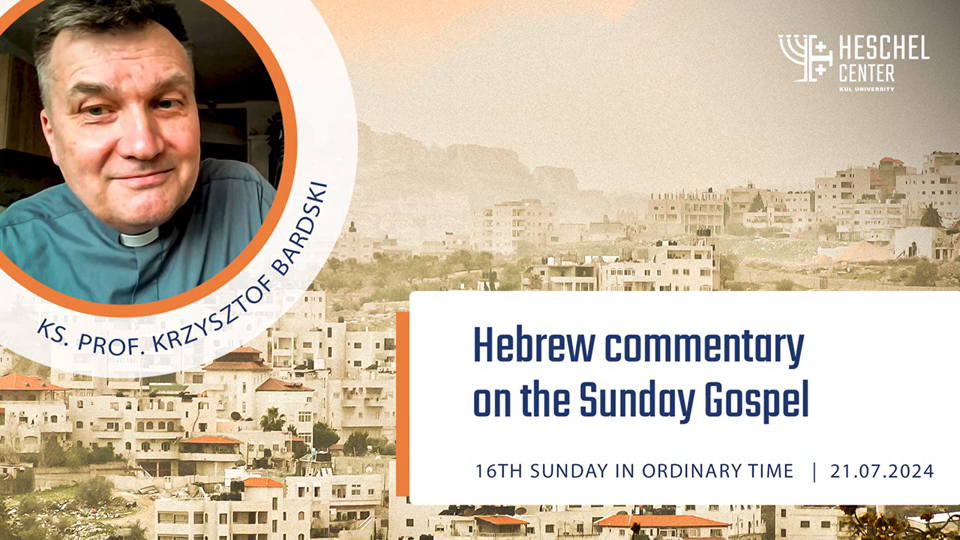“Many old certainties appear relative in the eyes of today’s man. And it is to such a man that Jesus comes with his ‘Gospel of empathy.’ He turns over the table of ossified theological approaches and, through the mouth of Pope Francis, calls out to ‘get up from the couch,’ go on the road, seek Him”, stresses Rev. Prof. Krzysztof Bardski, Lecturer at the Catholic Academy in Warsaw, in a commentary for the Heschel Center of the Catholic University of Lublin’s, for Sunday, July 21.
It’s vacation time. Many of us have traveled far from the year-round daily routine. We turned off business phone numbers and the email inbox ordered to inform that by this and that day the addressee is “not available”.
Today’s Gospel tells us that Jesus too, along with his disciples, is going on “vacation.” “Go ye yourselves separately into the wilderness and rest a little”. Jesus empathizes with the disciples, who have just returned from demanding apostolic work. Jesus understands their fatigue and nervous tension. He knows they need rest. So does he himself, a true man – “son of man,” as he describes himself.
And here’s an unpleasant surprise. Threads of “wilderness.” Crowds eager to meet Jesus “converged there on foot from all the cities.” If Jesus had followed the set plan, he should have cleared the crowds away: – Please disperse. Give us a moment’s peace. Come next week, for now we have a time set aside for rest.Jesus, however, acts differently. He changes his plans, alters a previously made decision and “begins to teach them about many things.” Note, however, that the key word explaining Jesus’ change of attitude is “took pity” on them. The Greek text, and even more so the Aramaic and Hebrew verbs that may be behind it, indicate a deep inner stirring of Jesus’ heart. He not only “took pity,” but “experienced emotion,” “felt empathy” for the people who came to Him. It was Jesus’ empathy that made His earlier plans relative, changeable, dependent on the circumstances of meeting another person.This is also the way Jesus encourages his Church to go. Pope Francis reminded us in Lisbon that the Church’s teaching is not some unchanging monolith. It is a merciful response to the questions and dramas of man unfolding in every era. We live in post-modern times. Many traditional patterns have lost their bearing. A new understanding of man, human relations, freedom, truth is emerging. Many old certainties appear relative in the eyes of today’s man. And it is to such a man that Jesus comes with his “Gospel of empathy.” He turns over the table of ossified theological approaches and, through the mouth of Pope Francis, calls out to “get up from the couch,” go on the road, seek Him. And He will change His plans, which seemed to us “eternal and unchangeable.” “He will take pity on us … and begin to teach us about many things” anew, in the kind of language that the postmodern world in which we live continues to produce.
And here’s an unpleasant surprise. Threads of “wilderness.” Crowds eager to meet Jesus “converged there on foot from all the cities.” If Jesus had followed the set plan, he should have cleared the crowds away: – Please disperse. Give us a moment’s peace. Come next week, for now we have a time set aside for rest.Jesus, however, acts differently. He changes his plans, alters a previously made decision and “begins to teach them about many things.” Note, however, that the key word explaining Jesus’ change of attitude is “took pity” on them. The Greek text, and even more so the Aramaic and Hebrew verbs that may be behind it, indicate a deep inner stirring of Jesus’ heart. He not only “took pity,” but “experienced emotion,” “felt empathy” for the people who came to Him. It was Jesus’ empathy that made His earlier plans relative, changeable, dependent on the circumstances of meeting another person.This is also the way Jesus encourages his Church to go. Pope Francis reminded us in Lisbon that the Church’s teaching is not some unchanging monolith. It is a merciful response to the questions and dramas of man unfolding in every era. We live in post-modern times. Many traditional patterns have lost their bearing. A new understanding of man, human relations, freedom, truth is emerging. Many old certainties appear relative in the eyes of today’s man. And it is to such a man that Jesus comes with his “Gospel of empathy.” He turns over the table of ossified theological approaches and, through the mouth of Pope Francis, calls out to “get up from the couch,” go on the road, seek Him. And He will change His plans, which seemed to us “eternal and unchangeable.” “He will take pity on us … and begin to teach us about many things” anew, in the kind of language that the postmodern world in which we live continues to produce.
About the AuthorRev. Prof. Krzysztof Bardski – Lecturer at the Catholic Academy in Warsaw. Translator and editor of the Ecumenical Bible and the St. Paul’s Edition Bible. Author, translator and editor of books and scholarly articles on biblical and patristic subjects.










